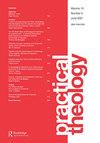Special themed issue: Majority world epistemologies
IF 0.4
0 RELIGION
引用次数: 0
Abstract
We are very happy to co-author the editorial for this special issue on majority world epistemologies. Apart from having the pleasure of working with colleagues researching and writing in Practical Theology from around the world, we also enjoyed collaborating with the wider group of guest editors working on and introducing this special issue. Practical theologians are situated in all corners of the globe embodying the quest to make sense of their own lived experiences and of those around them from a faith perspective. A significant number of these theologians find themselves in the so-called ‘majority world’. While we would like to employ the term majority world in a neutral and practical sense to denote the countries where the majority of the world population reside, it is not that simple, as all designations applied to people are tainted in some way or another. Mindful of the fact that the term majority world was partially born as replacement for the now, derogatory term ‘third world’, it is not above reproach. Many still associate the majority world with the ‘third world’ and the later designation of ‘developing countries’. In the postcolonial era, this is however regarded as problematic because these designations are suspected of perpetuating stereotypes and sustaining historical divides among people. And maybe, herein lies the challenge, that we sometimes need designations to denote groups of people or nations, without attributing stereotypical characteristics. It might be helpful to view terms like the majority and minority worlds through a less tainted lens, namely that of the global village. This term organically grew from the sense of connectedness that resulted from our interconnectedness via the world wide web (Anderson 2006). The notion of the global village recognises two important aspects of our current existence in the world. One is that the globe has indeed shrunk to a ‘village’ of shared experiences as a result of web-based interconnectedness as seen in news networks and social media. In African thinking, the notion of a village conjures up a pleasant sense of belonging based on shared experiences and the embodiment of Ubuntu, which is a constant reminder that we can only truly be human with and through others. In this sense, the notion of the global village encourages us to constantly find ways to deepen global communal sharing and living. The notion of the global village, however, also recognises another important aspect of our current being, which is the fact that the communal village remains scattered around a vast globe. The lived experiences of global villagers thus inadvertently play out in different geospatial, social, political and economic realities. Each of these contexts represent unique histories, cultures and belief systems which result in distinctive ways of knowing and living. One of the historic downsides of geographical divides is the ignorance of other ways of knowing and living – often contravening the sentiments of Ubuntu. In this regard the thinking of Portuguese social theorist Boaventura De Sousa Santos (2007, 2016) is most helpful in reminding us of abyssal thinking that made us ignorant of other ways of knowing and knowledge – creating abyssal lines between our own ways of knowing and knowledge and others. At主题特刊:多数世界认识论
我们很高兴能共同为这期关于多数世界认识论的特刊撰写社论。除了与来自世界各地的同事一起研究和写作实践神学之外,我们还很高兴与更广泛的客座编辑团队合作,共同推出这一期特刊。实用神学家分布在世界的各个角落,他们从信仰的角度来理解自己的生活经历和周围的人。这些神学家中有相当一部分人发现自己处于所谓的“多数世界”。虽然我们希望在中立和实际的意义上使用“多数世界”一词来表示世界上大多数人口居住的国家,但这并不是那么简单,因为适用于人民的所有名称都以某种方式受到污染。考虑到“多数世界”一词的部分诞生是为了取代现在贬义的“第三世界”,这并非无可非议。许多人仍然将大多数世界与“第三世界”和后来的“发展中国家”联系在一起。在后殖民时代,这被认为是有问题的,因为这些名称被怀疑使刻板印象永久化,并维持人们之间的历史分歧。也许,这里存在着挑战,我们有时需要名称来表示人群或国家,而不是归因于刻板印象的特征。从一个不那么受污染的角度,也就是地球村的角度来看,多数世界和少数世界等术语可能会有所帮助。这个词是由我们通过万维网相互联系而产生的联系感有机地发展而来的(Anderson 2006)。地球村的概念承认了我们目前在世界上存在的两个重要方面。其一,由于新闻网络和社交媒体的网络互联,全球确实缩小为一个共享经验的“村庄”。在非洲人的思维中,村庄的概念让人联想到一种愉快的归属感,这种归属感基于共同的经历和Ubuntu的体现,它不断提醒我们,我们只有通过他人才能真正成为人类。从这个意义上说,地球村的概念鼓励我们不断寻找加深全球公共共享和生活的方法。然而,地球村的概念也承认了我们当前存在的另一个重要方面,即公共村庄仍然分散在广阔的地球上。因此,全球村民的生活经历不经意地在不同的地理空间、社会、政治和经济现实中发挥作用。每一种环境都代表着独特的历史、文化和信仰体系,从而形成了独特的认识和生活方式。地理差异的历史缺点之一是对其他认识和生活方式的无知——经常与Ubuntu的情感相抵触。在这方面,葡萄牙社会理论家Boaventura De Sousa Santos(2007年,2016年)的思想最有帮助地提醒我们,深渊思维使我们对其他认识和知识的方式一无所知——在我们自己的认识和知识方式与他人之间创造了深渊界限。在
本文章由计算机程序翻译,如有差异,请以英文原文为准。
求助全文
约1分钟内获得全文
求助全文

 求助内容:
求助内容: 应助结果提醒方式:
应助结果提醒方式:


